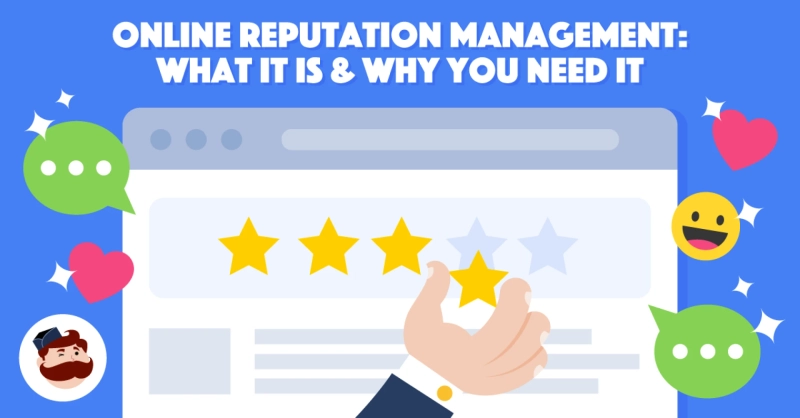For organizations, businesses, and individuals to establish trust, and credibility, and achieve success in the dynamic and competitive online environment of the twenty-first century, it is critical to maintain a positive online reputation. Online reputation monitoring is an essential procedure encompassing the surveillance, evaluation, and administration of online references, evaluations, critiques, and input about an individual, organization, merchandise, or service across an assortment of digital platforms and channels. This article will examine the fundamentals of online reputation monitoring and the reasons why businesses and individuals must effectively monitor their online reputation.
Online reputation monitoring is what?
Online reputation management (ORM) encompasses the activities of monitoring, analyzing, and controlling online mentions, reviews, comments, and feedback about an individual, brand, product, or service. These activities take place across a multitude of digital channels and platforms, including but not limited to search engines, social media, review platforms, blogs, and news websites. The principal objective of online reputation monitoring is to promptly detect and respond to favorable and unfavorable mentions, feedback, and sentiments to establish, uphold, and safeguard a favorable online reputation—and bolster confidence, credibility, and achievement in the era of digitalization.
What is the significance of online reputation monitoring?
There are numerous factors why online reputation monitoring is vital for organizations, businesses, and individuals:
Establish Trust and Credibility: By actively monitoring online mentions, reviews, and feedback, businesses, and individuals can promptly and professionally identify and resolve customer concerns, questions, and issues. This showcases their dedication to customer satisfaction and responsiveness, thereby fostering the development of trust and credibility among customers and stakeholders.
Improve Brand Image and Perception: By monitoring online mentions and feedback, individuals and businesses can identify and address negative mentions, reviews, and sentiments while promoting positive mentions, testimonials, and stories, allowing them to shape and enhance their brand image and perception while also cultivating a positive and reputable online presence.
Improve Customer Satisfaction and Loyalty: By promptly and professionally monitoring and responding to online mentions, feedback, and reviews, you can demonstrate attentiveness, engagement, and commitment to addressing customer concerns and improving the overall customer experience and relationship.
Encourage Business Growth and Success: In the competitive and ever-changing digital environment, effective monitoring and management of online reputation can stimulate sales, revenue, and profitability, as well as attract and retain customers, boost brand visibility and awareness, and increase website traffic and conversions.
Fundamentals of Online Reputation Monitoring:
1. Identify Platforms and Critical Digital Channels
Online reputation monitoring begins with the identification of key digital channels and platforms where your target audience, consumers, and stakeholders are active and engage with your brand. These channels and platforms include search engines, social media platforms, review sites, forums, blogs, and news websites.
Routine Actions:
Perform an investigation to ascertain and rank critical digital channels and platforms that are pertinent to your sector, intended demographic, and brand.
Establish and manage profiles and accounts on prominent digital channels and platforms to effectively monitor and respond to online feedback, mentions, reviews, and comments.
2. Establish System Notifications and Alerts
By utilizing online reputation management tools and platforms, organizations and individuals can establish alerts and notifications to track real-time online mentions, reviews, comments, and feedback about their brands, products, and services.
Routine Actions:
Employ online reputation management tools and platforms to monitor and address significant brand mentions, keywords, and hashtags across critical digital channels and platforms. Notable examples include Google Alerts, Mention, Brand24, and Hootsuite.
Obtain real-time notifications regarding positive and negative mentions, reviews, comments, and feedback by configuring alert settings. This enables you to promptly and professionally identify and respond to opportunities and challenges.
3. Surveil and Assess Online Dialogue and Remarks
Conducting routine surveillance and analysis of online mentions, reviews, comments, and feedback about your brand, products, and services across prominent digital channels and platforms is critical to discern trends, patterns, and sentiments, as well as to guide the development of online reputation management strategies and initiatives.
Routine Actions:
Allocate consistent time to oversee and evaluate online mentions, reviews, remarks, and feedback across critical digital channels and platforms by utilizing platforms and tools for online reputation management.
Conduct an examination and classification of online mentions and feedback according to sentiments (positive, neutral, negative), themes, and topics to detect trends, patterns, and insights that can effectively guide the development of online reputation management strategies and actions.
4. Engage and Respond in a Timely and Professional Manner
Promptly and professionally responding to online mentions, reviews, comments, and feedback enhances one's reputation, trustworthiness, and engagement with customers and stakeholders, as well as showcases a commitment to customer satisfaction.
Routine Actions:
Formulate and execute explicit and uniform protocols and guidelines about the timely and expert handling of online mentions, reviews, remarks, and feedback across critical digital platforms and channels.
Express gratitude and appreciation in response to positive mentions, reviews, comments, and feedback to cultivate engagement, loyalty, and advocacy.
To bolster trust and credibility, it is imperative to handle and resolve negative mentions, reviews, comments, and feedback in a professional and empathetic manner. This demonstrates a commitment to customer satisfaction, accountability, and responsiveness.
5. Assess and Monitor the Performance of Online Reputation
By utilizing online reputation management tools, platforms, and analytics to monitor and measure online reputation performance, organizations, and individuals can assess the efficacy of online reputation management and monitoring strategies and actions, as well as pinpoint potential areas for optimization.
Routine Actions:
Employ online reputation management platforms, tools, and analytics to oversee and quantify critical performance indicators (KPIs), including but not limited to customer satisfaction and loyalty metrics, online mention volume, sentiment analysis, engagement rate, and response time.
Consistently assess and analyze the performance of one's online reputation to detect trends, patterns, and insights that can guide strategic decision-making and enhance the effectiveness of online reputation monitoring and management strategies and actions.
To conclude,
Online reputation monitoring is an essential procedure encompassing the surveillance, evaluation, and administration of online references, evaluations, critiques, and input about an individual, organization, merchandise, or service across an assortment of digital platforms and channels. Through the aforementioned fundamentals of online reputation monitoring—which encompass identifying critical digital channels and platforms, configuring alerts and notifications, monitoring and analyzing online mentions and feedback, promptly and professionally responding and engaging, monitoring and evaluating online reputation performance—both individuals and organizations can efficiently establish, sustain, and safeguard a favorable online reputation, bolster trust and credibility, and
Investing in online reputation management tools, platforms, and strategies is critical for businesses and individuals to prioritize Top online reputation management and monitoring practices. This enables proactive tracking, analysis, and management of online mentions, reviews, comments, and feedback across critical digital channels and platforms. The ultimate goal is to establish, sustain, and safeguard a favorable online reputation, bolster trust, credibility, and profitability, and facilitate growth, success, and profitability.



